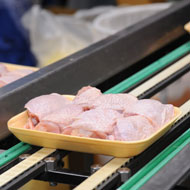2 Sisters chief grilled by MPs

Efra Committee chair Neil Parish accepted the company’s pledge to make improvements, but warned of the consequences if promises are not followed through. (stock photo)
The chief executive of 2 Sisters Food Group has apologised for a scandal that saw one of his plants suspend operations, after undercover footage appeared to show food safety breaches.
Covert footage taken by the Guardian and ITV News shows one worker changing the source and slaughter date on a tray of poultry at the West Bromwich plant. A worker is also seen picking chicken up from the floor and returning it to the production line, and older poultry appears to be mixed up with fresher meat.
The exposé prompted several major retailers to suspend buying from the plant.
Chief executive Ranjit Singh Boparan was grilled by MPs as part of an Efra Committee inquiry into the apparent food safety breaches. Mr Boparan said he was “disappointed and upset” by the footage, and “absolutely apologise[s]” for the doubt it caused among consumers and clients.
Referring to the product that was picked up from the factory floor, he said it “absolutely should not have happened”, but he stopped short of agreeing that the footage showed food safety breaches and defended the changing of dates on labels.
The member of staff shown changing the label has since been sacked. 2 Sisters technical director Chris Gilbert-Wood said this decision was made as the member of staff was not authorised to change labels and was ‘uncooperative’ during the company’s internal investigations.
Whilst Mr Boparan and Mr Gilbert-Wood argued that changing labels in certain circumstances is acceptable for an authorised member of staff, they have strengthened their processes to make them “less fool-proof”.
The company’s own investigations are still ongoing, and the pair pledged to share the final results with the Efra Committee once they are complete. Mr Boparan said: “We have changed a number of things. I reassure you we will continually improve, I reassure you that food safety will be the highest of our agenda, I reassure you that the food that we produce is safe”.
However, one committee member pointed out that previous breaches have been identified at some of the company’s other plants, in 2009, 2013 and 2014. Additionally, there is evidence from a former quality assurance manager who worked at the West Bromwich plant that kill labels were being changed back in 2009.
“There is no reason to believe anything is going to change in the future,” the committee member said.
Another committee member asked Mr Boparan if poor standards were “endemic” at the factory and “part of its culture”. However, Mr Boparan said he “cannot accept” that the factories have low standards, insisting food safety is treated as a high priority.
He claimed some of the allegations made by the Guardian and ITV News were “very misleading” and invited the Efra Committee to come to his factory, “announced or unannounced”.
As a result of the investigation, training for new staff now takes eight hours rather than four, and is repeated every year, rather than every three. A mystery worker will also be sent around the factory to ensure policies are being followed. Existing staff were recently re-trained for two weeks and subsequently tested.
Some members of the committee questioned why 2 Sisters management were unaware of the issues at West Bromwich. Mr Boparan said the plant has 36 CCTV cameras, but none in the area filmed by the undercover reporter. The chief executive promised to ensure all areas will be covered by CCTV in future, and has employed full-time staff to monitor the CCTV during production to ensure food safety policies are followed.
Mr Boparan said he would “absolutely welcome” the presence of a full-time inspector on site.
Efra Committee chair Neil Parish accepted the company’s pledge to make improvements, but warned Mr Boparan of the consequences if his promises are not followed through.



 The Federation of Independent Veterinary Practices (FIVP) has announced a third season of its podcast, Practice Matters.
The Federation of Independent Veterinary Practices (FIVP) has announced a third season of its podcast, Practice Matters.